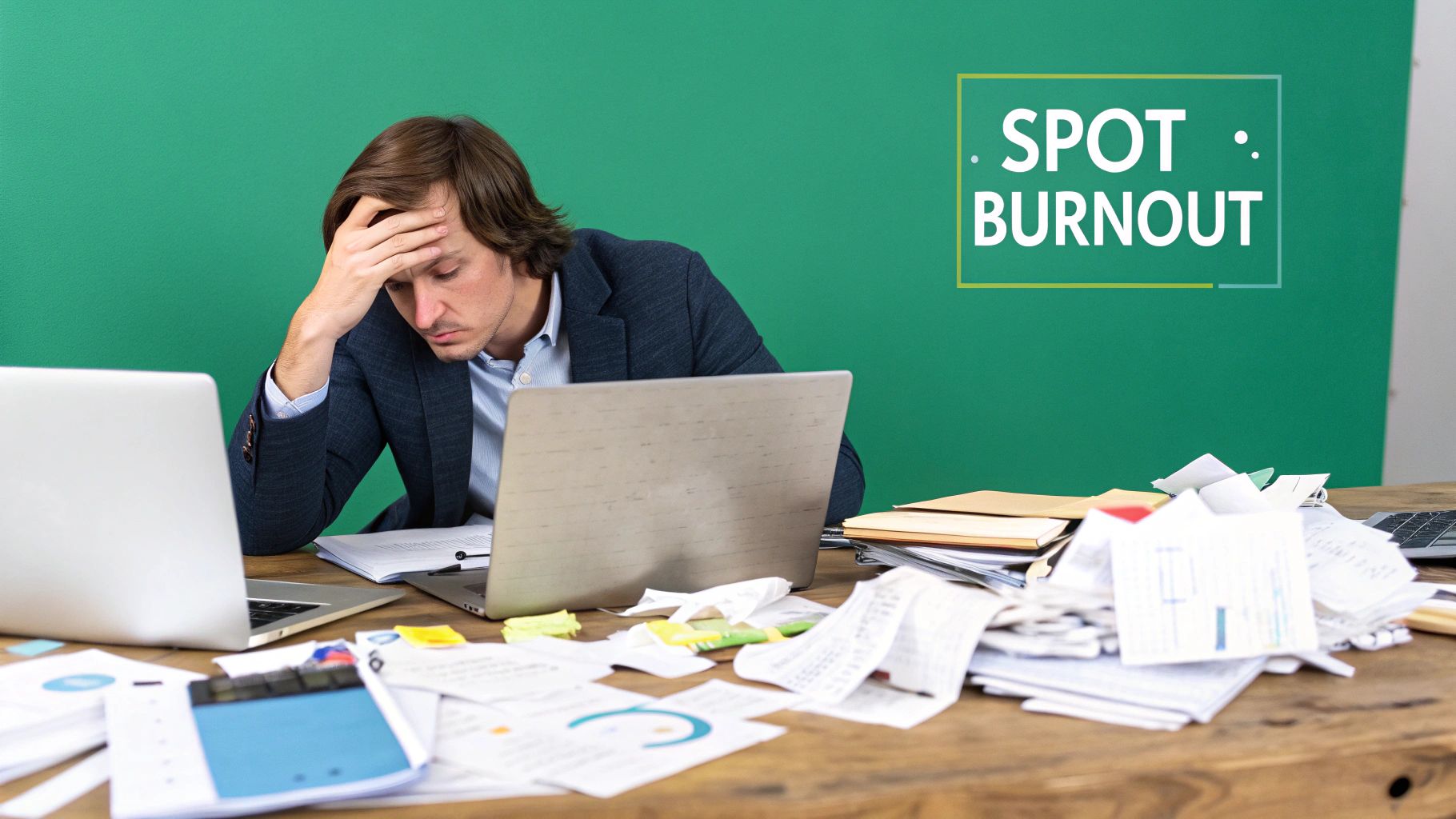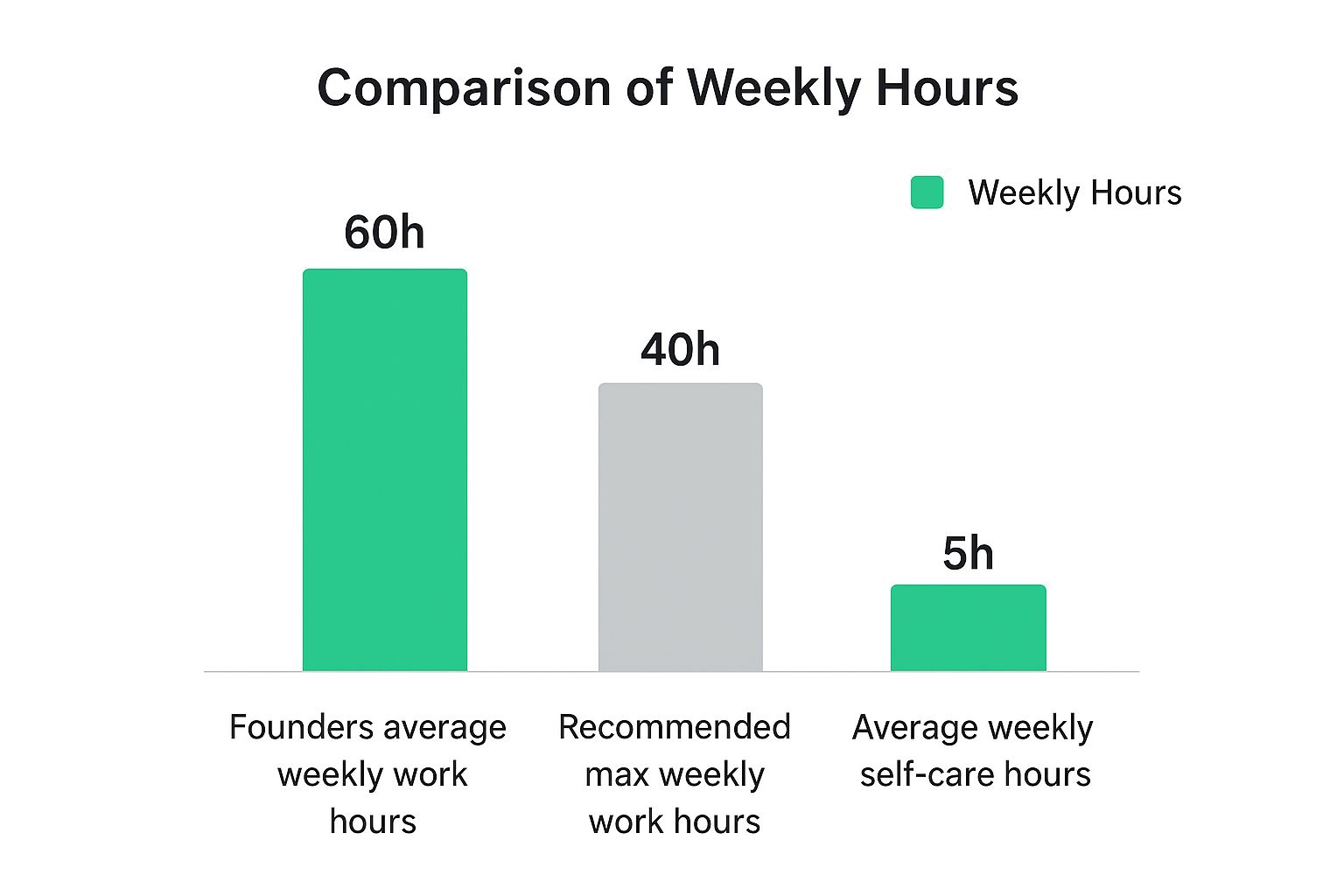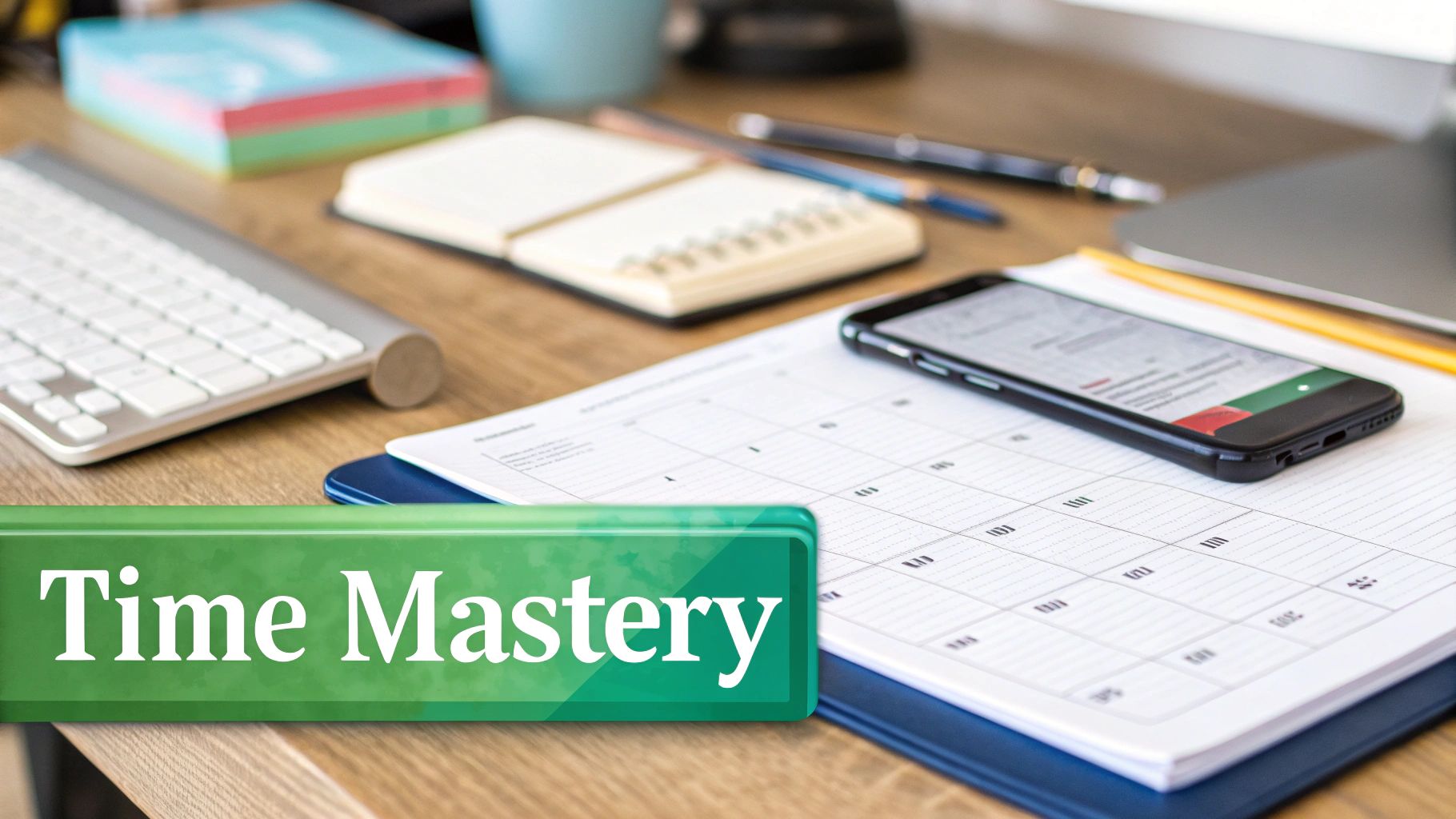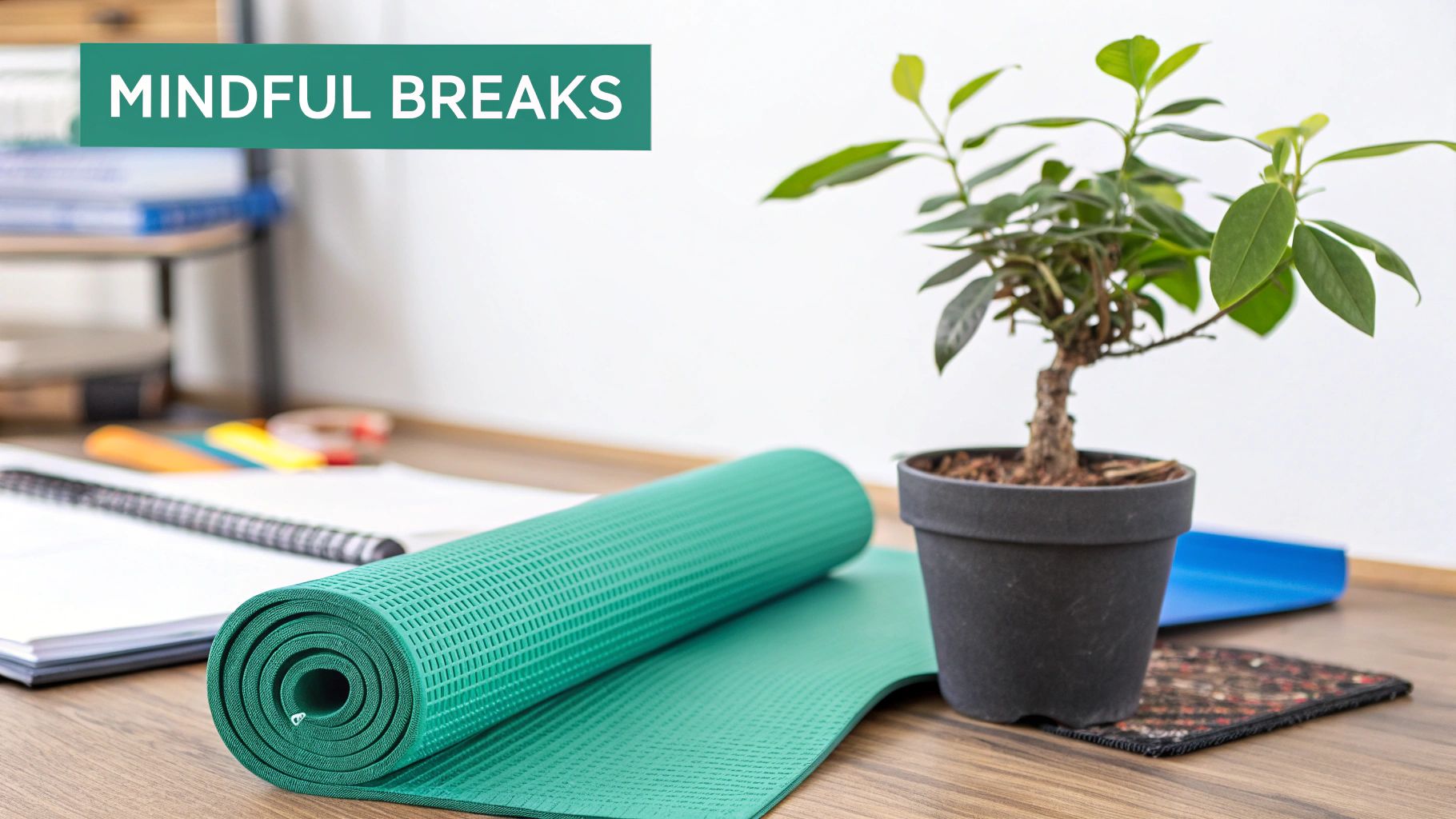The Hidden Epidemic: Understanding Founder Burnout

The entrepreneurial journey is often portrayed as a glamorous adventure. However, the reality for many founders includes a hidden struggle: founder burnout. This isn't just typical work fatigue. It's a deeper issue impacting founders across all industries, threatening the very heart of the startup ecosystem.
The Unique Pressures of Startup Life
The constant drive for success, combined with the inherent instability of startups, creates a perfect storm for burnout. Founders often juggle numerous roles, from product development and marketing to securing funding and managing their teams. This constant demand leads to chronic stress, lack of sleep, and a persistent feeling of being overwhelmed.
Imagine a founder simultaneously managing a critical product launch, securing vital funding, and resolving internal team conflicts, all while battling fierce competition. It's a heavy burden to carry.
The fundraising treadmill adds another layer of complexity. This constant cycle of pitching, negotiating, and securing capital is emotionally and mentally draining. The sting of rejection and the pressure to meet investor expectations add significant stress. Even after securing funding, the pressure doesn't vanish; it simply evolves into new challenges.
Warning Signs and Statistics
Recognizing the early signs of founder burnout is crucial for personal well-being and business success. Common warning signs include persistent exhaustion, cynicism, difficulty focusing, and reduced productivity. Unfortunately, these symptoms often go unaddressed, as founders prioritize their businesses over their own health.
This prioritization has contributed to a concerning rise in mental health challenges among startup founders. To better understand this issue, let's take a look at the following table:
Founder Burnout: Statistics & Warning Signs
| Statistic/Warning Sign |
Percentage/Impact |
Prevention Consideration |
| Founders reporting no mental health issues in the past year |
6% |
Prioritizing mental health from the outset |
| Founders experiencing high stress |
83% |
Implementing stress management techniques |
| Founders experiencing burnout in the past 12 months |
54% |
Building strong support networks |
| Difficulty concentrating |
|
Mindfulness and focus exercises |
| Persistent exhaustion |
|
Prioritizing sleep and rest |
| Cynicism |
|
Fostering a positive work environment |
| Decreased productivity |
|
Setting realistic goals and expectations |
This table highlights the prevalence of burnout among founders and lists some common warning signs. It also offers preventative measures to consider. It’s crucial to address these issues proactively to avoid long-term consequences.
A recent survey by Sifted revealed alarming statistics: only 6% of founders reported no mental health issues in the past year. A staggering 83% experienced high stress, with 54% facing burnout within the last 12 months. The current economic climate, making fundraising challenging, further fuels this cycle of stress. Learn more about founder mental health. This underscores the critical need for preventative strategies. A personalized burnout prevention plan, incorporating strategies outlined in this helpful article on how to prevent burnout, can be incredibly beneficial.
Beyond Personal Wellbeing: The Business Imperative
Addressing founder burnout isn’t just about self-care; it’s vital for business success. Burnout can negatively impact decision-making, leading to poor choices that jeopardize a company's future. It can also damage team morale, decrease productivity, and increase employee turnover.
Ultimately, preventing founder burnout is about building sustainable businesses. By prioritizing well-being, founders can create a more resilient and thriving entrepreneurial ecosystem. This requires a shift in mindset—one that recognizes the vital connection between personal health and business success. This understanding is essential not just for navigating the challenges of startup life but also for creating a lasting, positive impact.
Building Your Anti-Burnout Founding Team
Your founding team is your most powerful burnout prevention tool. However, many entrepreneurs make critical mistakes when building their teams. This section explores the importance of a well-structured founding team and its impact on preventing founder burnout.
The Power of Shared Responsibility
The entrepreneurial journey can be isolating, especially for solo founders. They carry the full weight of every decision, setback, and success. This isolation significantly increases burnout risk. The following infographic highlights the disparity between a founder's average work hours, recommended maximum work hours, and time for self-care:

The data reveals a significant gap between the average founder's work hours and the recommended maximum, leaving minimal time for self-care. This imbalance necessitates strategies to reduce workload and prioritize well-being. A key strategy is establishing a strong founding team. Want to learn more about co-founders? Check out this helpful resource: What is a Cofounder?
A robust founding team significantly mitigates burnout risks. Sharing responsibilities, brainstorming solutions collaboratively, and offering mutual emotional support makes a profound difference. It's like having a built-in support network within your company.
The advantages extend beyond shared responsibility. Startup founders face numerous challenges that can contribute to burnout, and the team's structure is critical. Solo founders often take 3.6 times longer to scale their businesses and are 23% more likely to fail than startups with two to three co-founders. Founder conflict contributes to 65% of high-potential startup failures. Preventative measures, like founder agreements, can reduce this risk by 44%. Building a strong team dynamic from the start is crucial. For more detailed statistics, see this article.
Distributing Cognitive and Emotional Labor
A successful founding team strategically distributes cognitive labor (the mental work) and emotional labor (managing the emotional demands). This balance prevents any single founder from becoming overloaded.
Cognitive Labor Distribution: Clearly defined roles and responsibilities, based on each founder’s strengths, are vital. One founder might excel at product development, while another thrives in marketing. This specialization maximizes efficiency.
Emotional Labor Distribution: Acknowledging and addressing the emotional toll of entrepreneurship is just as crucial. Founders need to support each other, celebrate wins together, and foster an environment of vulnerability.
Navigating Founder Relationships
The founder relationship is the most critical partnership in a startup. It must be structured to offer support, not add stress.
Open Communication: Establish clear communication protocols, including regular check-ins and transparent discussions about challenges.
Conflict Resolution Framework: Disagreements are inevitable. A framework for addressing conflicts constructively, before they escalate, is essential.
Shared Vision: Alignment on a shared vision and values is fundamental for minimizing friction and establishing a strong foundation for decision-making.
Role Clarity and Communication
Role clarity and effective communication are two key elements that prevent founder burnout.
Role Clarity: Clearly defined roles prevent overlap, reduce ambiguity, and empower founders to own their areas of expertise, minimizing conflict and maximizing focus.
Communication Protocols: Regular meetings, dedicated communication channels, and reporting structures keep everyone informed and aligned. This streamlines workflows and reduces stress. Need help with Co-founder Agreements? This guide can help.
Let's explore the differences between solo founders and teams in more detail:
To illustrate these points, let's examine the key differences between solo and team founding:
Solo vs. Team Founding Comparison
This table compares burnout risk factors, business outcomes, and prevention strategies between solo founders and various team configurations.
| Factor |
Solo Founders |
2-3 Co-Founders |
4+ Co-Founders |
| Burnout Risk |
High (Isolation, workload) |
Moderate |
Lower (Shared responsibility) |
| Decision-Making |
Fast, but potentially flawed |
Balanced, diverse perspectives |
Slower, potential for conflict |
| Workload |
Heavy, all-encompassing |
Distributed, specialized |
Distributed, but requires more coordination |
| Emotional Support |
Limited, external resources needed |
Built-in support system |
Strong support, but potential for groupthink |
| Scaling Speed |
Slower |
Faster |
Can be faster, but complexity increases |
| Failure Rate |
Higher |
Lower |
Can be lower, but depends on team dynamics |
| Conflict Potential |
Lower (internal) |
Moderate |
Higher (interpersonal dynamics) |
| Prevention Strategies |
Strong self-care routines, external mentors |
Clear roles, communication protocols, founder agreements |
Structured communication, conflict resolution framework, team building activities |
Key takeaways: While solo founders benefit from speed and autonomy, they face higher burnout and failure risks. Teams enjoy shared responsibility and support, but require proactive communication and conflict resolution strategies. Larger teams offer more resources, but also introduce increased complexity.
By building a strong, supportive founding team, entrepreneurs share burdens, navigate challenges together, and create a more sustainable and fulfilling experience. This approach not only reduces burnout risk but also increases the likelihood of long-term success. This shared journey, built on mutual support and clear communication, leads to both personal fulfillment and business prosperity.
Creating Work Systems That Actually Prevent Collapse
Even the most passionate founders need systems that protect their mental health. Building a startup demands intense dedication, but long-term success hinges on avoiding burnout. This section explores how to design work systems that prioritize founder wellbeing without sacrificing business momentum.
Energy Management vs. Time Management
Traditional time management techniques often prove inadequate for founders. The ever-shifting nature of startups demands a shift towards energy management. This means understanding your peak performance times and strategically scheduling demanding tasks for those periods. For example, if you’re sharpest in the mornings, tackle critical thinking then and save less demanding work for the afternoon. This optimizes productivity and minimizes cognitive overload.
Regular breaks and short rest periods throughout the day can dramatically improve focus and prevent mental fatigue.
Decision Protocols for Preventing Fatigue
Constant decision-making significantly contributes to founder burnout. Establishing clear decision protocols streamlines this process and reduces mental strain. This might involve creating a framework for evaluating options, delegating decisions to team members, or setting time limits for discussions.
By systematizing decision-making, founders conserve mental energy for crucial strategic choices. This also empowers team members and promotes a more efficient work environment.
Designing Your Calendar for Genuine Recovery
Founders often pack their calendars with back-to-back meetings and activities, mistaking busyness for productivity. True recovery requires dedicated downtime. Schedule genuine breaks, not just a change of task. Block out time for activities that recharge you, whether it’s exercise, family time, or hobbies.
This planned downtime isn't a luxury; it’s an investment in your long-term performance and wellbeing. Founders must be intentional about setting boundaries and protecting their personal time. The rising issue of founder burnout isn't just a personal problem; it impacts a startup’s performance and longevity. Reports indicate 72% of founders experience mental health impacts, with 45% rating their mental health as ‘bad’ or ‘very bad’. Find more detailed statistics here. Initiatives like Virgin StartUp's ‘walk & talk’ events highlight the value of community and open conversations.

Team Structure and Communication for Disconnection
Building a team that functions well without you is vital for preventing burnout. Clearly defined roles, coupled with efficient communication channels, allow you to disconnect without worrying about disruptions. This involves empowering your team and providing the resources and autonomy they need to manage daily operations.
Effective delegation isn’t just assigning tasks; it's about building trust and fostering shared responsibility.
Recognizing “Hustle Habits” That Sabotage Success
"Hustle culture" often glorifies overwork, but constantly pushing yourself to the limit is unsustainable. Recognize when your “hustle habits” become counterproductive. Learn to distinguish between productive effort and self-sabotage. This requires honest self-reflection and a willingness to prioritize long-term sustainability over short-term gains.
By building work systems that protect your mental health, you safeguard both your personal wellbeing and your venture’s success. Recognizing these patterns is key for implementing lasting change. By creating systems that support individual wellbeing and business goals, founders can build resilient and thriving startups.
Managing the Financial Stress Behind Founder Burnout
Financial stress significantly contributes to founder burnout, yet it's often overlooked. This section explores practical strategies for managing the intense financial pressures entrepreneurs face.
Separating Personal Finances From Company Performance
Many founders link their personal financial security directly to their company's performance. This creates immense pressure, amplifying the emotional impact of setbacks. Building a financial safety net separate from company funds is crucial for preventing founder burnout. This might involve maintaining a personal emergency fund or diversifying income streams. This separation provides psychological safety, enabling founders to make objective business decisions without the added weight of personal financial survival.
Structuring Compensation and Runway Planning
How founders structure their compensation and manage their company's runway (the time before funding runs out) significantly affects burnout levels. Taking a modest, sustainable salary reduces pressure and demonstrates responsible leadership. Realistic runway planning, combined with contingency plans for unexpected challenges, provides a sense of control and reduces anxiety. This proactive approach creates stability and fosters better decision-making during stressful periods.
Frameworks for Major Financial Decisions
Founders constantly face difficult financial decisions. Developing a clear framework for these choices helps prevent emotional depletion.
- Defining clear criteria: Establish specific ROI thresholds for investments.
- Seeking expert advice: Consulting with financial advisors or experienced mentors offers valuable perspective.
- Establishing decision timelines: This prevents endless deliberation and analysis paralysis.
These structured approaches create order and lessen the emotional burden of complex financial choices. To avoid team overload and founder burnout, consider effective strategies like those described in Jira capacity planning strategies.
Communicating Financial Realities
Open and honest communication about financial realities is essential but requires careful consideration to maintain relationships and protect mental health.
- With Co-founders: Transparency builds trust and reduces anxiety within the founding team.
- With Employees: Clearly communicating the company’s financial position, without causing undue alarm, fosters a sense of shared purpose.
- With Investors: Honest updates, even when sharing difficult news, build credibility and strengthen investor relationships.
Building a Sustainable Financial Foundation
Founders must recognize that financial stability is key to preventing burnout. By separating personal finances, structuring compensation wisely, and creating clear decision frameworks, entrepreneurs build a foundation for long-term success. Open communication and a focus on long-term sustainability further reduce stress and promote both personal well-being and business growth. This proactive approach to financial management is an investment in the founder’s mental health and the company's future.
Building Your Founder Support System (Before You Need It)

Founder burnout is a serious risk, significantly amplified by isolation. Many founders, however, wait until they're already struggling before seeking help. This is a reactive approach. Instead, successful founders proactively build support systems to prevent burnout.
This proactive approach is key to navigating the inherent difficulties of the startup journey. It’s about building resilience before you need it.
Identifying Your Ideal Peer Founders
Connecting with the right peer founders can be a game-changer. These individuals offer a unique understanding of your struggles, something that family, friends, and even mentors often can’t fully grasp. When searching for these connections, focus on founders with similar values, industry background, or startup stage. IndieMerger and its AI-powered matching can help you find those ideal connections.
This targeted approach fosters a strong sense of shared experience and builds a foundation of mutual support. It's about creating a community where you can openly share and learn from one another.
Formal vs. Informal Support Structures
Both formal and informal support structures play crucial roles in preventing founder burnout. Formal structures, like accelerator programs or mastermind groups, offer a structured learning and sharing environment. Informal networks, such as casual meetups or online communities, provide a more relaxed atmosphere for connecting with others.
Joining an accelerator, for instance, not only provides mentorship and resources but also connects you with a cohort of founders navigating similar challenges. This can be incredibly valuable for sharing experiences and finding solutions together.
Navigating Vulnerability and Competition
Sharing vulnerabilities is powerful but requires establishing healthy boundaries. Over-sharing can create unnecessary emotional burdens, while under-sharing prevents deep connections. It's important to calibrate your vulnerability depending on the relationship. You might share more with a close peer founder than in a larger group setting.
Also, be mindful of competitive comparisons, especially within your industry. Focus on the shared experience of being a founder, not on comparing metrics or milestones. The goal is to support each other, not compete.
Maintaining Connections During High-Stress Periods
Ironically, founders often isolate themselves from their support systems when they need them most. This only exacerbates burnout. It’s critical to intentionally maintain these connections, especially during high-stress periods.
Schedule regular check-ins, even brief messages or calls. This proactive approach strengthens your network and ensures you have people to lean on during difficult times. A simple recurring weekly coffee date with a peer founder can provide a consistent outlet for sharing challenges.
Founder Case Studies: Vulnerability and Support
Learning from experienced founders who’ve successfully navigated burnout offers invaluable insights. Many emphasize the importance of establishing a support system before burnout sets in.
Practical strategies they highlight include:
- Regular peer group meetings: A structured setting to discuss challenges and find solutions together.
- "Accountability buddies": Checking in on each other’s well-being and progress.
- Mentorship relationships: Seeking guidance from experienced founders who've faced similar situations.
These examples show the various support systems available. Proactively building and maintaining these connections creates a safety net for navigating the emotional and mental demands of entrepreneurship. IndieMerger can be a powerful tool in building this essential network. This network not only prevents burnout but also contributes to long-term success.
Mental Frameworks That Prevent Founder Burnout
The founder mindset: it can propel you to incredible heights, but it can also lead to burnout. This section explores the mental strategies that build resilience, drawing insights from psychologists who specialize in working with entrepreneurs and founders who’ve successfully overcome significant challenges.
Managing Perfectionism, Impostor Syndrome, and Catastrophic Thinking
Perfectionism, impostor syndrome, and catastrophic thinking are common mental patterns that contribute to founder fatigue. These thought patterns create constant internal pressure, making it difficult to appreciate wins and amplifying the impact of setbacks. You might find this helpful: How to master founder mental health.
Perfectionism: Striving for excellence is a positive trait, but unchecked perfectionism can lead to stagnation and self-criticism. Learn to distinguish between aiming for high quality and demanding an impossible standard of flawlessness. Focus on progress, not an unattainable ideal.
Impostor Syndrome: Many founders, despite their accomplishments, feel like they are faking it. This persistent fear of being exposed can be draining. Recognize that these feelings are surprisingly common, particularly among high achievers. Acknowledge your successes and concentrate on continuous learning, not constantly proving your worth.
Catastrophic Thinking: This involves immediately assuming the worst possible outcome. It’s mentally exhausting. Practice reframing negative thoughts by asking: "What's the most realistic outcome?" This perspective shift reduces anxiety and promotes better decision-making.
Separating Your Identity From Company Performance
Many founders tie their self-worth to their company's performance. This creates enormous pressure. Imagine a founder whose identity hinges on every funding round or product launch – the emotional toll can be devastating.
Instead, cultivate a sense of self outside of the company. This separation offers psychological security, letting you handle challenges without feeling personally attacked. This means nurturing relationships, hobbies, and activities that define you beyond your role as a founder.
Maintaining Perspective During Setbacks
Setbacks are inevitable in the startup world. Resilient founders see these not as defeats, but as opportunities to learn and grow. They maintain perspective by focusing on the bigger picture and their long-term vision. This involves:
- Reframing setbacks: See challenges as temporary hurdles, not insurmountable roadblocks.
- Focusing on learning: Extract valuable lessons from every experience, positive or negative.
- Celebrating small wins: Acknowledge milestones and celebrate accomplishments along the way.
Processing Failure Without Emotional Depletion
Failure, though painful, is part of the entrepreneurial journey. Resilient founders develop strategies for handling these experiences without burning out. This involves:
- Allowing yourself to feel the emotions: Don't suppress your feelings. Acknowledge disappointment, frustration, or even grief.
- Analyzing the situation objectively: When the initial emotions subside, objectively analyze what contributed to the failure. What lessons can be learned?
- Seeking support from your network: Connect with trusted mentors, advisors, or other founders. Sharing your experience can help process emotions and provide valuable insights.
Implementing Mental Frameworks During High-Stress Periods
These mental strategies are most vital during periods of high stress, when negative thinking can take over. Implementing them takes practice and self-awareness.
Develop strategies to recognize destructive thought patterns and consciously apply these techniques to regain a balanced perspective. This might involve taking breaks, practicing mindfulness, or leaning on your support network.
By integrating these mental frameworks into your entrepreneurial life, you'll build resilience, reduce burnout risk, and create a more sustainable and fulfilling experience. This proactive approach to mental well-being is an investment in your health and your company's long-term success.
Your Personalized Founder Burnout Prevention Plan
Building a successful startup demands significant dedication, but it shouldn't come at the expense of your well-being. This means turning the strategies we've discussed into a personalized system that works for you, acting as a shield against burnout. It's about proactively building resilience, not simply reacting to exhaustion.
Assessing Your Unique Burnout Risk Factors
Every founder's experience is unique, just like every startup. Creating your personalized plan begins with a careful assessment of your individual burnout risk factors.
Founder Personality: Are you a workaholic by nature? Do you find it difficult to delegate? Understanding your personality traits helps you identify potential weaknesses. For example, if you're a perfectionist, building in systems for self-compassion becomes essential.
Business Stage: The demands of a seed-stage startup are vastly different from those of a growth-stage company. Analyzing your current business stage helps pinpoint specific stressors. A pre-revenue startup might be focused on product development, while a scaling company grapples with hiring and management challenges.
Current Stressors: Identify the most significant stressors impacting your life, both professional and personal. This honest self-assessment is crucial for developing effective solutions. Financial concerns, team disagreements, or family obligations all add to your overall stress level.
Designing Intervention Thresholds and Responses
Think of your mental and emotional energy like a fuel gauge. Designing intervention thresholds is similar to setting warning lights on that gauge, alerting you before you run out of fuel.
Triggers: Identify the specific signs that indicate you're approaching burnout. This could be persistent trouble sleeping, increased irritability, or a constant feeling of dread.
Responses: Develop predetermined responses for each trigger. These could involve taking a day off, delegating a task, or speaking with a trusted mentor. These responses are more than self-care; they’re strategic interventions that protect your well-being and your business. Check out our guide on founder burnout prevention for more strategies.
Building Accountability and Integrating Practices
Accountability is key for any plan. This could mean partnering with a co-founder, joining a peer support group, or working with a coach. These systems offer external support and ensure you remain on track. Integrating preventive practices into your routine makes them sustainable.
Daily Practices: Include small but impactful daily practices in your schedule. This might involve brief meditation sessions, regular exercise, or dedicated time to disconnect each evening. These practices provide ongoing maintenance for your mental and emotional well-being.
Emergency Protocols: Develop protocols for high-stress periods like fundraising or a significant product launch. These could involve pre-planned breaks, additional support from team members, or access to mental health resources. These protocols provide a safety net during particularly demanding times.
Measuring Effectiveness and Adapting Your Plan
Just as you monitor key metrics for your business, you should also track the effectiveness of your burnout prevention plan. Regularly assess your stress levels, energy levels, and overall well-being. This data allows you to adjust your plan over time.
This continuous evaluation ensures your strategy remains relevant and effective, evolving with you and your business. This adaptable approach to burnout prevention builds a resilient foundation for long-term success.
Are you looking to connect with a co-founder who understands the challenges of startup life and can share the load of building a thriving business? IndieMerger can help. Our AI-powered platform connects verified founders with complementary skills, assisting you in building your anti-burnout founding team. Visit IndieMerger today to learn more and start building your dream team.